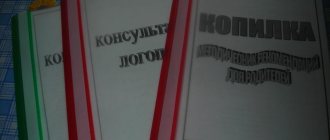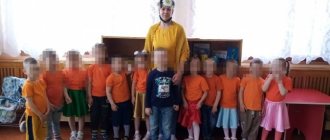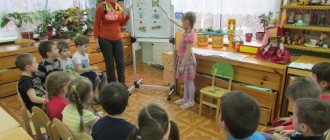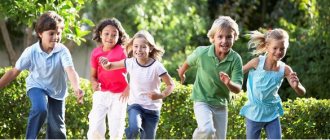Senior group project “Family and Family Traditions”
Anna Malkova
Senior group project “Family and Family Traditions”
Educator:
Malkova Anna Nikolaevna
Senior group project “Family and Family Traditions”
Project passport.
Project type : informational and creative
Project participants : senior children, teachers, parents.
Project duration : short-term (6 days)
Objective of the project:
1. expand children’s ideas about their family, pedigree, and family traditions;
2. cultivate love and respect for parents and ancestors, develop partnerships with the family.
Tasks:
Educational:
Expand children's understanding of family, moral attitude towards family traditions, holidays, and relics.
To consolidate knowledge about their immediate environment, to help children understand family ties.
Introduce children to the concept of “family tree”, pedigree.
Educational:
consolidate the ability to write a story about family members, name relatives, answer questions, develop children’s speech skills to conduct a monologue and dialogue, using their personal experience, and develop grammatically correct speech.
Educational:
cultivate love and respect for your family members, teach them to take care of them.
To interest parents by involving them in joint creative activities with their children.
To promote the development of close relationships between parents and teachers, to increase the interest of parents in interacting with preschool educational institutions.
Relevance:
The family is the first social institution that a child encounters in life and is a part of. The family occupies a central place in the upbringing of a child, plays a major role in shaping the worldview, moral standards of behavior, feelings, social and moral appearance and position of the child. In a family, raising children should be based on love, experience, traditions, and personal example from the childhood of relatives and friends. And no matter what aspect of a child’s development we consider, it will always turn out that the family plays the main role in the formation of his personality at different age stages.
In modern society, characterized by high activity, mental expenditure, and a lack of human warmth and attention, the connection between generations is lost, the family ceases to be a fortress and support for its members, traditions, customs, and the past are forgotten. The educational potential of the family is gradually weakening. Children do not have sufficient knowledge about their family members. And, after all, even ancient teachers believed that it was necessary to raise children with love and respect for their parents and veneration of ancestors, to raise a future family man from an early age. I really want the thread connecting people in family relationships to be a thick rope capable of holding the entire family together. This situation can be leveled out by including the family in the educational space of the preschool educational institution.
Planned result from the children:
• know the history of their family, family traditions, holidays and participate in them; an interest in learning about the history of one’s family has been formed.
Planned result from parents:
• the participation of parents in the life activities of their children and children's groups will increase.
• the pedagogical culture of parents will improve.
• parents' interest in continuing cooperation.
Project implementation stages
determination of the topic, goal, task;
selection of material (literature, visual material, didactic games);
preliminary conversations with children;
work with parents - introduce them to the upcoming project.
Contents of activities of the teacher and children:
OD.
Conversations with children, looking at family photos.
reading children's literature, sayings, proverbs, guessing riddles.
didactic, speech, role-playing, active and sedentary, finger games, games with construction sets.
Artistic and aesthetic activities: drawings “My Family”, “My Hand is My Family”, works using the plasticine technique “Flowers for Grandmothers and Mothers”.
Working with parents
conversations with parents;
collecting the necessary material;
parents’ assistance in designing the exhibition “Family Family Tree”, “Family Coat of Arms”, “World of Family Hobbies”;
reminders, consultations for parents;
participation in the city competition “Strong Family – Strong Power”.
Processing of project implementation results
Presentation of the project “My Family”
design of the exhibition “The Family Tree of My Family”, “The Coat of Arms of My Family”, “The World of Family Hobbies”.
Annex 1.
1. Conversations: “How do you understand what family is?”, “Clan and pedigree”, “Who do you want to be like? Why?”, “What do you like to do as a family?”, “How do you relax as a family? Where are you going?”, “What animals live in your home? Are they members of your family?”, “Hospitality, honoring parents - Russian traditions”, “Rights and responsibilities in the family”, “What do my parents do?”, etc.
2. Direct educational activities: FCCM “Organization of everyday life in our family (weekdays and holidays)”
3. Reading fiction: D. Rodari “Grey Hair”, E. Serova “Daddy is at Home”, S. Cherny “When No One Is Home”, C. Perrault “Little Red Riding Hood”, S. Marshak “The Tale of a Smart Mouse”, E. Permyak “Someone else’s gate”, “Mother’s work”, L. Kvitko “Grandma’s hands”, proverbs and sayings about family.
Discussion of the material read
4. Productive activity: drawing: “My happy family”, according to the template “My hand is my family”, modeling: “Flowers for grandmothers and mothers”.
5. Didactic games: “Fold the pattern” (Scarf for grandmother, “Say kindly about a family member”, “Say the opposite”, “In which fairy tale do families meet?”, “What kind of family do you have?”, “Who is older?”, “Whose things are these?”, with the ball “Collecting kind words”, etc.
6. Speech games: Compiling stories on the topic: “My family”, “Who do I live with”, “My dad, mom, grandparents”, “My best friend”, “What I like to do in kindergarten and at home” , “Mom’s portrait”, “How I help at home”
7. Role-playing games: “Family”, “Family lunch”, “A trip to a cafe with the family”, “Our day off”, “Mothers and daughters”, “Kindergarten”.
8. Games with the constructor: “Build a house for your family”, “My room” - playing with buildings, games with the constructor “Family”.
9. Finger games: “My fingers”, “Friendly family”, “Who lives in my family?”
10. Theatrical activities: puppet theater “Three Bears”
11. Musical activity: listening to songs about family, O. Devochkina “My Family”, “Grandmother Next to Grandfather”, Learning songs “Dear Mommy”, PMuz / Game “Who will gather in a circle faster?”
12. Work with parents: consultations “How to raise a child or lessons in politeness at home”, “A child learns what he sees in his home.”
Conversations about the role of family traditions, creation of a moving folder “Family Traditions”, conversation about the activities of family members, place of work, creation of an album “Professions of our parents”.
Design of exhibitions: “Geneological tree of the family”, “Family coat of arms”, “World of family hobbies”.
Issues of mini-posters “A healthy mind in a healthy body.”
Participation in the city competition “Strong family - strong power”




